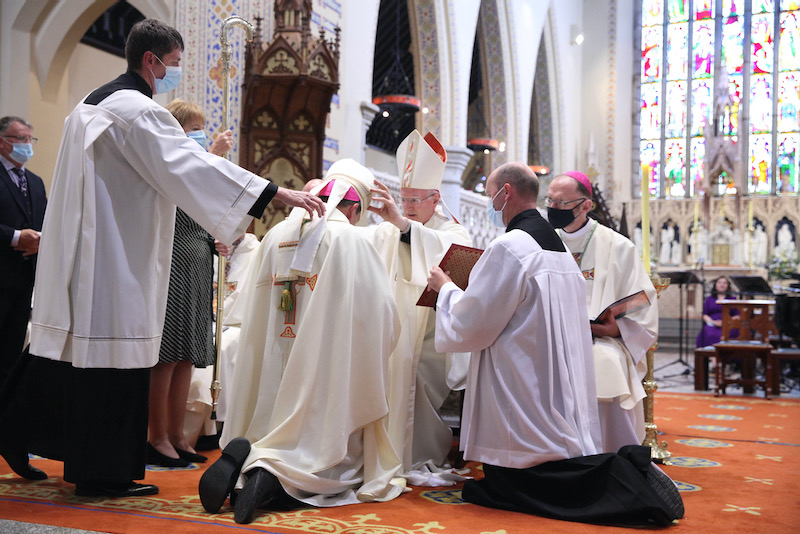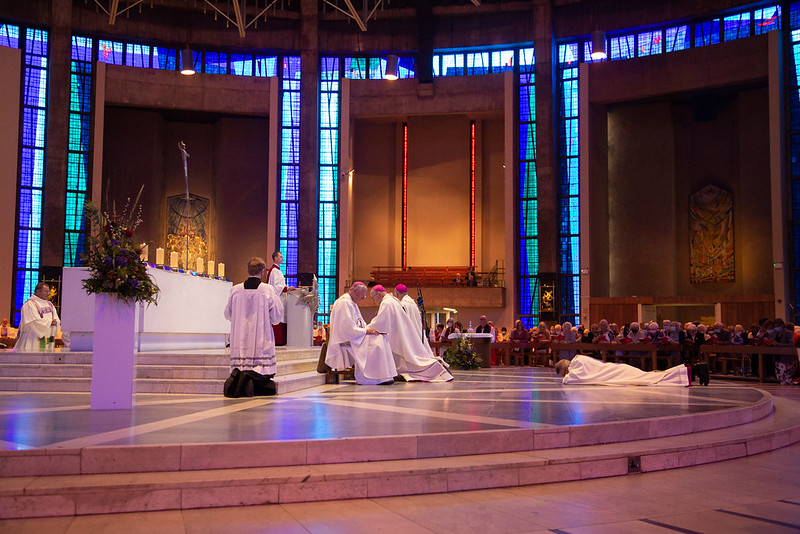Caritas Westminster has been asked by Bishop Paul McAleenan to co-ordinate the response by Westminster Diocese to Afghan refugees, ensuring that needs are effectively communicated and that help offered is directed successfully. Caritas Westminster is encouraging individuals and parishes to consider how they can support refugees long-term. It is asking them to consider whether they can provide temporary accommodation, and, to support and befriend refugees long-term. As well as practical help to ensure they have all they need in their new homes, refugees will need help as they try to access health care, education, and other services. There is a particular call for English language teachers.
Around 100 organisations wrote an open to Prime Minister Boris Johnson on 2 September to urge the government not to go ahead with the planned £20-a-week cut to Universal Credit and Working Tax Credit at the beginning of October. Among them were the Caritas Social Action Network and the ecumenical group Church Action on Poverty. The 100 signatories of the letter included leading voices on health, education, children, housing, poverty and the economy. Many provide frontline support in communities nationwide and have seen first-hand the importance of adequate social security. In their open letter they wrote: “We are rapidly approaching a national crossroads which will reveal the true depth of the Government’s commitment to improving the lives of families on the lowest incomes.” They felt the cut “risks causing immense, immediate, and avoidable hardship” adding that “a strong social security system is a crucial first step to building back better and we strongly urge you to make the right decision.”
Research by the Joseph Rowntree Foundation shows the £20 Universal Credit cut risks plunging 500,000 people into poverty, including 200,000 children. It says that 413 parliamentary constituencies across Britain will see at least a third of working-age families with children affected.
Canon Thomas Neylon has been installed as Auxiliary Bishop of Liverpool by Archbishop Malcolm McMahon of Liverpool, The Mass on 3 September was the first major service to be celebrated in the Metropolitan Cathedral since the beginning of the pandemic and the first Episcopal Ordination in the Cathedral since that of Bishop Tom Williams in 2003. Warrington-born Bishop Neylon will assist Archbishop Malcolm McMahon alongside Bishop Williams. The homily was preached by the Bishop Paul Swarbrick of Lancaster, who studied for the priesthood alongside Bishop Neylon. Among those taking part were the Apostolic Nuncio, Archbishop Claudio Gugerotti, together with Cardinal Vincent Nichols, Archbishop of Westminster, and other bishops from England and Wales. Priests and parishioners from throughout the Archdiocese of Liverpool also attended, with groups coming from Widnes, where Bishop Neylon served most recently, and from St Helens where he served for 24 years.
The Refugee Council and agencies of the Catholic Social Action Network (CSAN) are lobbying the Immigration Minister, seeking clarity around the proposed restrictions to refugee family reunion. This comes ahead of MPs pondering the Nationality and Borders Bill when they return from recess. Caritas Shrewsbury and Caritas Salford are amongst those asking their contacts to write to Chris Philip, the Minister for Immigration, asking for details of the restrictions. They fear that refugees from Afghanistan and elsewhere who arrive to the UK via irregular routes will be unfairly criminalised under the government’s new Bill.
“The Nationality and Borders Bill was deeply flawed when it was first introduced and now those flaws are even more stark in light of the events in Afghanistan," the Jesuit Refugee Service UK said on twitter on 2 September. It described the bill as “discriminatory and inhumane.” There is concern the proposed legislation would create a discriminatory two-tier asylum system, undermining how the UK fulfils its international obligations to those seeking asylum. The Bill would punish refugees, depending on how they arrived in the UK, resulting in a significant reduction in the number of women, men and children who are able to access family reunion, one of the few existing safe and regular routes into the UK. Any restriction on family reunion rights could result in family members being left with the heartbreaking choice to either stay permanently apart or risk their lives on treacherous journeys in order to reunite. Campaigners feel all refugees should have full and equal access to family reunion rights, regardless of how they enter the UK.
A leading member of the Legion of Mary, which is celebrating the centenary of its foundation this week, has appealed to priests to allow the lay apostolic association help them revitalise Irish parishes. Bernard Spillane, who is acting president of the Legion of Mary in Cork, told the Irish Examiner that despite falling vocations and increased workload, some priests are reluctant to allow the Legion of Mary to work in their parishes.He said members of the Legion, which was founded by Frank Duff in Dublin in September 1921, “are up to the challenge of parish work, and we are ready and willing to assist priests, if priests want us to do it. As we mark our centenary, we would like to bring the legion back into vogue again.” At a Mass in Dublin to mark the centenary of the Legion of Mary, Archbishop Dermot Farrell of Dublin noted how the Legion of Mary had grown out of the St Vincent de Paul Society and spread all over the world. Frank Duff’s vision for the lay apostolic movement was “to offer concrete ways for Catholic lay people to live out the gospel”.
Child sexual abuse has been found to take place in most major UK religions, according to the latest report by the Independent Inquiry into Child Sexual Abuse. Some religious organisations were found to have no child protection policies in place at all. IICSA found “blatant hypocrisy” and “shocking failings” among religious organisations purporting to teach right from wrong and yet failing to prevent or respond to child sexual abuse.
Life has announced the death of co-founder Nuala Scarisbrick. She died peacefully at home with Jack her husband and their two daughters Emma and Sarah by her side on Tuesday 31 August. Nuala was the driving force behind the building of the client support services still active today – especially her “hotline” which evolved into our National Helpline. Her tireless passion to support women and families in crisis saved lives on a daily basis and will continue. Chris Whitehouse KCSG, a trustee of Right To Life UK, said: “Nuala was a pillar of the pro-life movement and an incredible woman. She will be sorely missed. Yet, the legacy that outlives her and her determination will surely be a model for the next generation. The pro-life movement would not be where it is today without Nuala’s courage and tireless dedication. Nuala’s passion for supporting women and families in crisis has saved lives - these are literally thousands of people throughout the UK who are alive today because of her pioneering work.” Thoughts, memories, and condolences of Nuala can be shared in the Book of Condolence available on Life Charity’s website.
The UK’s largest pro-life group, the Society for the Protection of Unborn Children (SPUC), will be working under the fresh leadership of John Deighan KSG. Mr Deighan stepped up on 1 September to become the organisation’s Chief Executive Officer (CEO) Mr Deighan comes to his new position armed with a strong track record in political campaigning and media engagement on ethical issues over almost 30 years at both the Scottish and Westminster Parliaments. Outlining his hopes for SPUC, Mr Deighan said: “My vision is simple, I want to see an end to abortion and I am truly committed to that end. I believe the skills and resources we have in SPUC can be harnessed coherently for that effort. For too long, the pro-life issue has not been given the attention proportionate to its fundamental importance as the human rights issue of our age. The enormous strength we have always had at SPUC is our massive grassroots community and how we mobilise those supporters to exert influence on our political leaders. We will continue to grow that community and invest more in online outreach and social media advertising. I believe SPUC is in an excellent position to build on our position as the leading grassroots pro-life organisation in the UK, with a powerful international reputation. I am determined to carry that effort forward at a time when society has never needed us so urgently.”
Thousands took part in the first in-person March for Life in London since May 2019. The Lifestream 21 took place on 4 September inside the Emmanuel Centre in Westminster. The event included testimonies and workshops from leading pro-life speakers as well as short films, music, and much more. More details are available on the March for Life UK website and their Facebook page.
The CEO of Social Justice Ireland has appealed to the Irish government not to leave those on social welfare behind for a third successive budget. Fr Sean Healy SMA, a member of the Society of African Missions who founded the independent think tank, warned in a statement that economic recovery in the past had shown that the weakest in society get left behind unless welfare increases track improvements elsewhere in the economy. “Given the very difficult situation people across the country are in as a result of Covid-19, benchmarking minimum rates of social welfare payments to movements in average earnings is an important policy priority,” Fr Healy said. He also noted that Budget 2021 was the second budget in a row which failed to deliver an increase to the minimum social welfare payment. Failure to address this in Budget 2022 would see those who are most vulnerable fall further behind. “Delivering a fair recovery means that no-one should be left behind, especially those who are most vulnerable,” Fr Seán Healy said. Social Justice Ireland estimates that more than 12,000 working age adults would have been raised out of poverty in 2016 had minimum social welfare payments been benchmarked at 27.5 per cent of average earnings.
The Council of Priests in the Diocese of Cloyne has given its backing to a suite of changes in an effort to deal with the “reality of a reduced and aging presbyterate”. In a letter to priests, the Council notes that 29 of Cloyne’s 46 parishes now have just a single priest. The diocese has roughly 150,000 Catholics. “Were it not for the generous service of our retired priests, the shortage would be much more obvious. Each reduction in personnel means that more is being asked of the remaining priests,” the letter states. Warning that difficult choices must be faced if the situation is to be honestly and prudently faced up to, the Council says this includes a reduction in the number of Masses. Priests in the diocese have been meeting over the past year to discuss possible responses to the reality of fewer priests. In addition to a renewed promotion of vocations, they have agreed to share responsibilities across pastoral areas. Their recommendations, which are now diocesan policy, includes the decision not to allow funerals or weddings take place on Sundays. “Having fewer but better prepared Masses that bring together a greater number of the local faith community can make for a more authentic celebration of the Lord,” the letter states.



 Loading ...
Loading ...